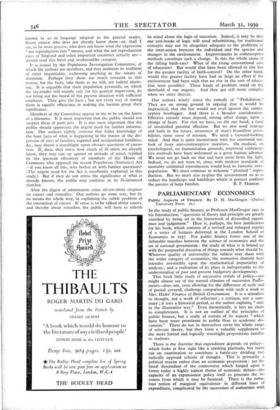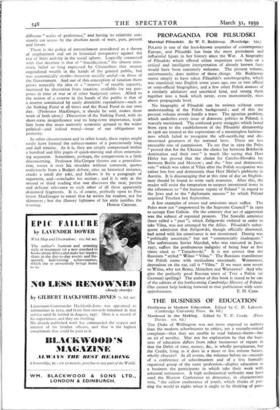PARLIAMENTARY ECONOMICS
IN the study of public finance, as Professor MacGregor says in his Introduction, " questions of theory and principle are greatly enriched by being set in the framework of diversified experi- ence and judgement." Here is, perhaps, the best justification for his book, which consists of a revised and enlarged reprint of a series of lectures delivered at the London School of Economics in 1937. For public finance forms one of the debatable marches between the science of economics and the art of national government : the study of what is is bound up with the purposeful direction of things towards what should be. Whatever quality of universality the subject may share with the wider category of economics, the normative element here intrudes irresistibly upon the mathematical impartiality of analysis ; and a realisation of its place is indispensable to the understanding of past and present budgetary developments.
This brisk little study of successive trends of policy—one might almost say of the mental climates of successive Parna- ments—does not, even allowing for the difference of scale and of period covered, challenge comparison with such a work as Mrs. Hicks' Finance of British Government. It is a stimulant to thought, not a work of reference ; a critique, not a sum- mary ; it uses a historical period, as the author explains, " only in the illustrative way." Even theoretically, it lays no claim to completeness. It is not an outline of the principles of public finance, but a study of certain of its aspects " which have been more prominent in public than in academic dis- cussion." These do not in themselves cover the whole range of relevant theory, but they form a valuable supplement to the more formal and logically watertight propositions familiar to students.
There is the doctrine that expenditure depends on policy— which looks at first sight like a crashing platitude, but turns out on examination to constitute a battle-cry dividing two radically opposed schools of thought. This is primarily a political maxim rather than an economic proposition: yet the lineal descendant of the controversy which hinged upon it forms today a highly topical theme of economic debate—the capacity of an expansionist policy itself to generate the in- comes from which it may be financed. There is the nebu- lous notion of marginal equivalence in different lines of expenditure, complicated by the succession of authorities with
different " scales of preference," and having its relativity con- stantly cut across by the absolute needs of wars, past, present and future.
There is the policy of retrenchment considered as a theory of employment and set in historical perspective against the rise of State activity in the social sphere. Logically connected with that doctrine is that of " fructification," the almost axio- matic belief so long expressed by Chancellors that money engendered wealth in the hands of the general public, but was economically sterile—however socially useful—in those of the Government. And out of this conception of taxation there grows naturally the idea of a " reserve " of taxable capacity, increased by abstention from taxation, available for tax pur- poses in time of war or of other budgetary crises. Allied to the notion of a reserve in the hands of the public is that of a reserve constituted by easily divertible expenditure—such as the Sinking Fund at all times and the Road Fund in our own day. (Professor MacGregor, it should be said, makes short work of both ideas.) Discussion of the Sinking Fund, with its short-term insignificance and its long-term importance, leads him from this more narrowly economic ground to the wider political—and indeed moral—issue of our obligations to posterity.
In other circumstances and in other hands, these topics might easily have formed the subject-matter of a portentously long and dull treatise. As it is, they are crisply compressed within a hundred and fifty pages of quick-moving and often entertain- ing argument. Sometimes, perhaps, the compression is a little disconcerting. Professor MacGregor throws out a generalisa- tion, tosses it over his shoulder without comment, quotes maliciously from a Budget debate, cites an historical instance, cracks a small dry joke, and follows it by a paragraph of argument, and—concludes his section ; and it is only at the second or third reading that one discovers the neat, precise and delicate relevance to each other of all these apparently disjointed fragments. It is, of course, perfectly open to Pro- fessor MacGregor to retort that he writes for readers, not for skimmers ; but the illusory lightness of his style justifies the warning.
HONOR CROOME.



































































 Previous page
Previous page